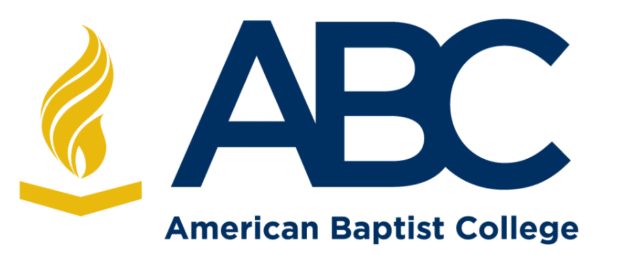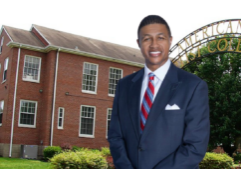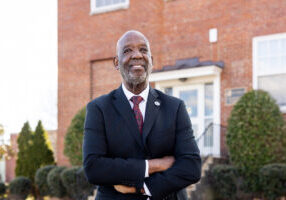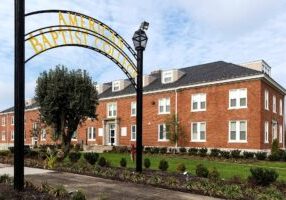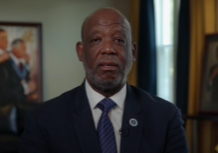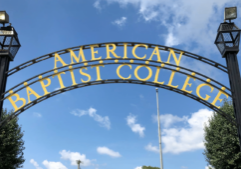President Forrest Harris, Sr.’s Spring Convocation Address (January 24, 2023)
Text Mark 5:24
Welcome to the Spring 2023 Semester here at American Baptist College. As president of this institution, I am incredibly proud to celebrate the 98th year of this glorious historic institution in the spirit of this convocation. More than ever in its history, American Baptist College is a critical movement of education. In today’s culture, our movement responds to people struggling, searching for love that transforms, knowing the truth that sets free, and justice that liberates mind, body, and soul. On the Road to a centennial celebration, American Baptist College is a continuous movement of education that liberates the mind, transforms the soul, and sets students free to align life with the God of Jesus. We have been in that movement since 1924.
Before I say more, let’s welcome our new students. They represent a 16% increase in our student population and a persistence rate of over 80%. We are making progress from the impact of pandemic declines on our student population.
You come here at a moment when we are engaged in an institutional self-study to comprehend and reimagine “what education is for,” determining how effective we are as deliverers of education. We are working toward ambitious institutional goals listed in the College’s 2022-2023 Institutional Effectiveness Report. That report also contains statements about the College’s Mission and Teaching Philosophy. We believe the combination of these statements carries significant weight in today’s culture. Today’s flood of conspiracy theories, illusions parading as truth, and revisionist efforts to camouflage and hide white supremacist values under the cover of Christianity, the College’s mission statement should wide social media distribution. It should be posted everywhere on campus, on the course syllabus, as a footer in public announcements.
We seriously take what education means to prepare leaders for Christian service and social justice in the world. The kind of education we envision grounds compassion and justice in all service fields for the higher good of the earth that’s the Lord’s and all that dwell therein. Students, you can be assured that our stewardship of intellectual capital and institutional resources are available to match your desire to become an educated person. We are a team, teacher/student relationships, a collegial partnership between faculty and staff working together to improve institutional life. Far from perfection but pressing together toward the mark of excellence in our academic ecology. We have much work to do to become efficient in every area of student success which is our highest commitment and priority.
To help better understand the mission we share, I want to talk about Recycling Fragments – The Task of Education as a way of understanding the current state of the College. There is a familiar biblical discourse in the sixth chapter of the gospel of John, verses 1-14, about feeding a diverse multitude following Jesus. According to the story’s plot line, a crowd numbering 5,000 journeys with Jesus to a desert place. The swelling crowd left their villages and homes following Jesus with little thought of preparation or provisions. Jesus was a captivating teacher. The crowd pressed in on Jesus to hear a teacher whose pedagogical vision brought to the surface an unusual embodiment of God’s truth they had not seen or heard from others. In the crowd – widows, orphans, the poor, sex workers, tax collectors, the unemployed, wanderers, broken people, religiously disillusioned people, scribes, addicts, magistrates, city leaders, tax collectors, Jewish Lives Matter folk, zealots, rebels, released prisoners, single mothers, abused women and children, the leftovers of society. People from all over the Roman colony of Judea living in desert zones of oppression pressed in on Jesus to hear him. They were hurting and hungry people desperate for the alignment of their existence with the true source of abundant life. Jesus knew there was a new way of being in the world and had compassion for the crowd’s desperate hunger.
Why do you suppose a crowd like that is essential to ABC’s educational mission? That crowd is us; their pangs of hunger are in us. Over the years, our admission policy opened portals for people in this crowd to come to the “Holy Hill” for education. People, after 98 years, still come here pressing for a deeper, truer, more authentic self. Life has fragmented them as inheritors of western legacies, cultures, and definitions of European life that have trapped them in a system of democracy’s failed promises and false images of success. Our institutional self-study over the last five years has been a process of innovation designing new educational patterns for students’ experience to help students reflect on and reimagine their callings or vocational possibilities.
Jesus turned to Philip and asked how they could feed the crowd. The disciples said to Jesus, we are in a desert place, send them away so that they may go into the towns and countryside and get victims. “Send them away” is not an adequate response for a Black College born out of the quest and struggles of the hungry for education, a mission of lifting the veil of knowledge for them. If we send the hungry and frustrated away, they will return to be angry, bitter, violent, and criminalized urban dwellers. They will lose faith in the deserts of life. They will live out fears rather than faith, recycle the false promises, the illusionary mastery of a self-autonomous, self-directed, economically independent individualism they see in the dominant image of what Yale Professor Willie James Jennings calls “white masculinity self-sufficient privilege” that will always elude them. Some of them will become brilliant mimickers and performers of white self-sufficient masculinity without ever discovering a sense of authentic self and presence that aligns with the God of their ancestry and respects the sacred in others.
Philip quickly reminded Jesus that they could not feed the multitude. They needed more resources to meet the situation. Similar situations are familiar to American Baptist College over its nearly one hundred years of existence. We know about resource deficits to educate the multitude. During the College’s institutional self-study, we learned of statistics, estimates, surveys, and appraisals of a small school with limited resources. We’ve become data specialists in recycling and turning around negative statistics. What has come out of this self-study is nothing short of the miraculous outcomes of dedication and service to vulnerable fragmented lives, the leftovers of society. Our culture has large columns of fragments, and leftovers to salvage and recycle. America’s Western education system has walked away from many fragments with great potential, vitality, and energy.
There was a boy in the crowd with five barley loaves and two small fish. “But what are they among so many,” said one of the disciples. This language sounds familiar to what we hear about this College. What can we do with limited resources to match the desires and needs of students? What the College has done with small-sized victuals is nothing short of a miracle. We exist on tuition-dependent revenue needing to attract the unrestricted deeper pockets of generous donors. We have learned to be realistic, practical, and non-alarmist about solutions. Black college closure across the country is a reality. But thank God the doors of ABC remain open to gather up and bring fragments together, so no one who comes to us remains in a desert place.
Jesus did not panic about the disciple’s feeble find among the crowd. The sixth verse states, “For Jesus, he knew what he would do.” On God’s agenda, the miraculous is always on the horizon. I am pleased to report that signs of miraculous breakthroughs are on the horizon for ABC. For example, a $1.6 million renovation of the Susie McClure Library makes it a state of the arts learning and research facility for students and faculty. Last week we received the great news that the Department of Commerce has awarded nearly $3 million to the College to address the digital divide/desert in the North Nashville community. The Covid-19 pandemic not only caused a decline in our student population but also brought to the surface the digital gap in the Black community among the poor, hampering children’s education and homes cut off from access to internet platforms. Digital justice is a matter that the College can now address.
Jesus took the loaves and fish, and when he had given thanks, he distributed them to the disciples, the disciples to the crowd. After eating to the full, Jesus said to his disciples, “gather us the fragments that remain, that nothing be lost.” Jesus was conscious of the higher good in leftovers. The fragments are symbolic. There are hopes, dreams, and imaginations in piles of scraps and pieces in the leftover basket of human beings. In our history, great personalities emerged from fragment baskets of racial segregation and a Jim Crow education system.
The disciples gathered twelve baskets of fragments, leftovers above what the crowd consumed to be recycled and salvaged. Such labor to fill the baskets of students’ unfinished potential can sometimes be overwhelming for a small staff. But the love of teaching, sharing in students’ transformations, and seeing the harvest of their lives is a joy.
People are waiting for someone to pick up the fragments. Many fragments are caught up in theological, biblical, and cultural misapprehensions. It is challenging to know the way. Western education from centuries of slavery to the Jim Crow era’s segregation educational system has left many in distorted formations. Fragments derived from colonial white supremacist logic leave the meaning of faith in shattered emotional and psychological pieces that make American Christianity’s ethics suspect and hypocritical. Fragments of freedom against non-freedom, racialized fragments, sexualized fragments, gender fragments, and commodity fragments – what is the way? Our education exists in these fragments. How can we come to know the truth that sets life free?
The first step perhaps most important is that education is a work in formation. You will hear the word formation repeatedly while you are here. The formation will happen; people change, even when impatient eyes do not readily perceive change. Over my twenty-plus years as the College president, I have seen formations that turned into transformations to a Christ-centered direction in life. Christ converts people from the worst things history has done to destroy people’s hope. Christ liberates and saves the self from distortions of the self and the systems that condemn the self. These formations and transformations happen not only to students but also to faculty who teach and College administrators. Education is the work of formation aligning fragmented lives with the Spirit of God, loving and learning creates a culture change.
The work of recycling fragments and salvaging leftovers against the claims and counterclaims, portraits of religion, culture wars, and racial divides is hard work for students to claim an identity for themselves or find their voice. My colleague and friend at Princeton University, Religious Historian Eddie Glaude in his article, Liberal Arts Education in the Age of Trump, says, “they live in an ongoing state of vulnerability and disruption that can cost them and those they love everything.” We do not take your fragments lightly. Jesus’ liberating love meets you at the site of your Blackness. The difficulty of envisioning a different world is a formidable battle of tearing down images that misrepresent Blackness at the expense of falsely upholding whiteness as superior. Spiritual, social, and emotional pain come from the absence of a voice and being forced to hear other voices not yours. The faculty is here to help you pick up the fragments, find your voice as you interact with the voices of the authors you will read.
You have urgent questions about why a world has gone mad and of Christianity joining that madness. Refuse to let your questions go. You are not a mixed group for failure. You are not racialized cargo for the prison pipeline. You may come from challenging home environments and underfunded public schools with teacher-student ratios insufficient to lift out the genius that lies deep within you. You can quickly become a fragment in this society. We live in the reality of fragments, pieces too much to hold all at once.
Our educational mission is to screen fragments from leftovers baskets. We live with broken pieces and leftovers in baskets of hope and possibilities. God works with fragments, recycling them with redemptive power. Many people come to Black colleges looking for help with fragments, hoping those who teach about faith recognize their own fragmentation and can help students reassemble, recycle broken hopes and shattered dreams, and help them gather up what remains that none of their God given gifts are lost. Before us are faith fragments, truth fragments, fragments of religion, the fragment of memories, pain, and suffering. When the pieces come together, they have life, energy, and spirit for a new direction.
The soul-stirring song artist Aretha Franklin was a fragment. She was a fragment from a basket of leftovers in Detroit. She once said, “I dreamed a dream in a time gone by when hope was high and life was worth living. I dreamed that love would never die. I dreamed that God would be forgiving. I will not let life kill the dreams I dream.” The literary prize winner Toni Morrison, after her fragments were recycled said, “There no greater agony than bearing an untold story inside of you.” She went on to author bestselling novels “Beloved” and “Bluest Eye.” There is a story that remains in every fragments. Students, your story of liberation and salvation needs to get out and be told.
James Baldwin, wondering about the alternatives for fragmented lives, found his voice. He authored his famous novel “Go Tell It on the Mountain” about an intelligent teenager in 1930s Harlem and his relationship with his family and church – moral chaos, contradictions, violent self-hatred, and a healing spirituality in the praise, song, dance, and testimony of Pentecostalism. We celebrate the life and legacy of Martin Luther King, Jr. He is a fragment recycled from the Black church’s basket of leftovers. Now King stands in the immortal history of a nation’s struggle to do justice, love mercy, and walk humbly with God.
I encourage the faculty, students, and administrators of this College to put our fragments together in the hands of Jesus. Jesus is patrolling the deserts and ravages of colonialism for fragmented souls like ours. We are here with a spirit of salvaging and recycling fragments for the good of the world. We cannot do this without the compassion and love that Jesus showed us. In Jesus’ hand, fragmented people can shout in a desert place. Praising God is natural for us rescued from a fragmented, leftover existence. Those lifted from baskets of fragments “Go tell it on the mountain, over the hills, and everywhere.” God is reassembling and bringing together pieces, recycling fragments. A new heaven and a new earth is on its way in the world. Old things are passing away. Behold, all things are becoming new.
